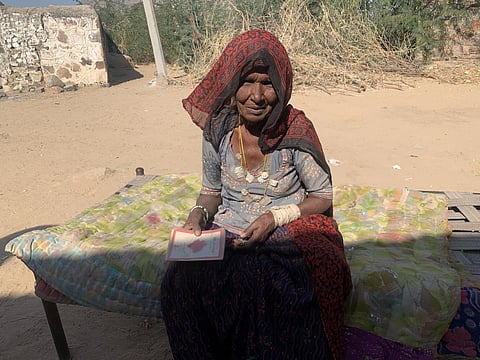

Biometric verification at public distribution system (PDS) shops to prevent theft is causing more trouble than they’re worth for 65-year-old Ghomati Devu. She and her dependents have not received any ration since October 2022.
Devu has lived in Joona Patrasar village, about 24 kilometres from Barmer in Rajasthan, for all her married life. The widow’s red ration card indicates she belongs to an impoverished family, categorising her below-poverty line.
State government guidelines dictate she is eligible for 35 kilogrammes of food grains for herself and an additional 5 kgs for each dependent member. However, before the rations stopped, she would only get around 20 kgs of food grains.
Officially, her two daughters — one 20-year-old and the other five — depend on her. However, the 20 kgs of rations used to be shared between seven members of her family, including her pregnant daughter and grandchildren. It would barely last a week.
“The rations stopped in October 2022. When I went to the shop, I was told that my fingerprints did not match the records. They tried to send a one-time password (OTP) to my phone for verification, but it never came and the process could not be completed,” she said.
Her ration card is also misprinted, showing her age as 15 years old. “How can I be younger than my daughter?” she asked. The sexagenarian blames the Prime Minister for her troubles. “Modi is not sending any grains for my family,” she said.
Devu used to work under the Mahatma Gandhi National Rural Employment Guarantee Act (MGNREGA), which was her only lifeline. But a broken forehand a few months ago put her out of work.
“I have a lot of debt piled up. I cannot pursue labour work any more,” she said. As per the norms, the unemployed and the elderly are also rightful beneficiaries of the red ration card.
Devu lost her husband to poor health several years ago. She has been struggling to survive for so long that she doesn’t even remember how long it has been.
“I have no cattle to support my livelihood and we are surviving on a Rs 1,500 pension that I receive from the government,” she told Down To Earth.
Anita Soni, a distant relative and social activist working for women empowerment, said Devu’s husband died before 2001.
The only other help Devu receives is from her relatives and she entirely depends on their generosity. The family survives on Bajra chapatis and curd.
Scheduled caste MGNREGA job card holders are also eligible to get water tanks built at their homes. But the officials concerned have yet to heed Devu's requests for one. The family lives in a kuchcha house of mud with a thatched roof.
Her daughter Bhuri used to work as a farm labourer before she became pregnant. “Even my husband does not receive ration despite being eligible because the fingerprints don’t match in the system,” she said.
There is never any money for medication or clothing. Sending the children to a government school is also a distant dream. “Studying in a government school may be free, but it demands clothes, bags and study material which we cannot afford,” she tells DTE.
The villages of Rajasthan report many cases like Devu’s where the population in dire need are unable to access food grains from the government even with legit ration cards.
The 65-year-old has decided not to participate in the voting process in assembly elections as a protest if her food supply isn’t resumed.
“Technology was supposed to create ease in accessing the rightful amount of food grains and remove corruption, but it is becoming a hindrance,” said Renu Indraraman from Bandha village, about 90 km away from Jaisalmer.
Renu, also a red ration card holder, used to receive her grains for 15 years, but since the system became online, she was denied her rightful rations.
“The fingerprints do not register for some reason. Often, the system is down. There are eight families in the village, like me, who are facing the same issue. With no access to food, we are doomed to live and die in poverty,” she stated.
Lakshmi, another villager, said she stopped receiving her share in September 2022. “What should I eat to survive? There are no jobs under MGNREGA in my Gram Panchayat,” she complained.
Bakse Khan from Kucchri village, about 46 km from Jaisalmer, said he stopped receiving food grains in 2016 since the online system was introduced in his block.
“I have tried registering on e-Mitra, the government website, to complete all the formalities. But following up on my case demands a 46 km journey and losing a day’s wage. It is impossible to afford the loss when job opportunities are scarce and there is no food at home,” he said.
Others are paying a heavy price for being daily labourers. “My hands have worn with heavy labour work. The damaged fingers do not detect my prints, thus depriving me of the food grains,” Dhararam, a daily wager from the same village.
With no money or food to survive, he has had to sell his prized possession, his goat. “The food grains from the government are supposed to be the ticket out of poverty, but for now, there seems no respite from the struggle for the basic necessity of survival — food,” he said.